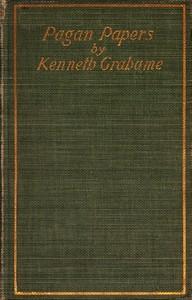|
|
Read this ebook for free! No credit card needed, absolutely nothing to pay.Words: 22606 in 4 pages
This is an ebook sharing website. You can read the uploaded ebooks for free here. No credit cards needed, nothing to pay. If you want to own a digital copy of the ebook, or want to read offline with your favorite ebook-reader, then you can choose to buy and download the ebook. The Romance of the Road The Romance of the Rail Non Libri Sed Liberi Loafing Cheap Knowledge The Rural Pan Marginalia The Eternal Whither Deus Terminus Of Smoking An Autumn Encounter The White Poppy A Bohemian in Exile Justifiable Homicide The Fairy Wicket Aboard the Galley The Lost Centaur Orion The Romance of the Road The best example I know of an approach to this excellent sort of vitality in roads is the Ridgeway of the North Berkshire Downs. Join it at Streatley, the point where it crosses the Thames; at once it strikes you out and away from the habitable world in a splendid, purposeful manner, running along the highest ridge of the Downs a broad green ribbon of turf, with but a shade of difference from the neighbouring grass, yet distinct for all that. No villages nor homesteads tempt it aside or modify its course for a yard; should you lose the track where it is blent with the bordering turf or merged in and obliterated by criss-cross paths, you have only to walk straight on, taking heed of no alternative to right or left; and in a minute 'tis with you again--arisen out of the earth as it were. Or, if still not quite assured, lift you your eyes, and there it runs over the brow of the fronting hill. Where a railway crosses it, it disappears indeed--hiding Alpheus-like, from the ignominy of rubble and brick-work; but a little way on it takes up the running again with the same quiet persistence. Out on that almost trackless expanse of billowy Downs such a track is in some sort humanly companionable: it really seems to lead you by the hand. Some sing you pastorals, fluting low in the hot sun between dusty hedges overlooked by contented cows; past farmsteads where man and beast, living in frank fellowship, learn pleasant and serviceable lessons each of the other; over the full-fed river, lipping the meadow-sweet, and thence on either side through leagues of hay. Or through bending corn they chant the mystical wonderful song of the reaper when the harvest is white to the sickle. But most of them, avoiding classification, keep each his several tender significance; as with one I know, not so far from town, which woos you from the valley by gentle ascent between nut-laden hedges, and ever by some touch of keen fragrance in the air, by some mystery of added softness under foot--ever a promise of something to come, unguessed, delighting. Till suddenly you are among the pines, their keen scent strikes you through and through, their needles carpet the ground, and in their swaying tops moans the unappeasable wind--sad, ceaseless, as the cry of a warped humanity. Some paces more, and the promise is fulfilled, the hints and whisperings become fruition: the ground breaks steeply away, and you look over a great inland sea of fields, homesteads, rolling woodland, and--bounding all, blent with the horizon, a greyness, a gleam--the English Channel. A road of promises, of hinted surprises, following each other with the inevitable sequence in a melody. There is a certain supernal, a deific, state of mind which may indeed be experienced in a minor degree, by any one, in the siesta part of a Turkish bath. But this particular golden glow of the faculties is only felt at its fulness after severe and prolonged exertion in the open air. "A man ought to be seen by the gods," says Marcus Aurelius, "neither dissatisfied with anything, nor complaining." Though this does not sound at first hearing an excessive demand to make of humanity, yet the gods, I fancy, look long and often for such a sight in these unblest days of hurry. If ever seen at all, 'tis when after many a mile in sun and wind--maybe rain--you reach at last, with the folding star, your destined rustic inn. There, in its homely, comfortable strangeness, after unnumbered chops with country ale, the hard facts of life begin to swim in a golden mist. You are isled from accustomed cares and worries--you are set in a peculiar nook of rest. Then old failures seem partial successes, then old loves come back in their fairest form, but this time with never a shadow of regret, then old jokes renew their youth and flavour. You ask nothing of the gods above, nothing of men below--not even their company. To-morrow you shall begin life again: shall write your book, make your fortune, do anything; meanwhile you sit, and the jolly world swings round, and you seem to hear it circle to the music of the spheres. What pipe was ever thus beatifying in effect? You are aching all over, and enjoying it; and the scent of the limes drifts in through the window. This is undoubtedly the best and greatest country in the world; and none but good fellows abide in it. Laud we the Gods, And let our crooked smokes climb to their nostrils From our blest altars. The Romance of the Rail In these iron days of the dominance of steam, the crowning wrong that is wrought us of furnace and piston-rod lies in their annihilation of the steadfast mystery of the horizon, so that the imagination no longer begins to work at the point where vision ceases. In happier times, three hundred years ago, the seafarers from Bristol City looked out from the prows of their vessels in the grey of the morning, and wot not rightly whether the land they saw might be Jerusalem or Madagascar, or if it were not North and South America. "And there be certaine flitting islands," says one, "which have been oftentimes seene, and when men approached near them they vanished." "It may be that the gulfs will wash us down," said Ulysses ; "it may be we shall touch the Happy Isles." And so on, and so on; each with his special hope or "wild surmise." There was always a chance of touching the Happy Isles. And in that first fair world whose men and manners we knew through story-books, before experience taught us far other, the Prince mounts his horse one fine morning, and rides all day, and sleeps in a forest; and next morning, lo! a new country: and he rides by fields and granges never visited before, through faces strange to him, to where an unknown King steps down to welcome the mysterious stranger. And he marries the Princess, and dwells content for many a year; till one day he thinks "I will look upon my father's face again, though the leagues be long to my own land." And he rides all day, and sleeps in a forest; and next morning he is made welcome at home, where his name has become a dim memory. Which is all as it should be; for, annihilate time and space as you may, a man's stride remains the true standard of distance; an eternal and unalterable scale. The severe horizon, too, repels the thoughts as you gaze to the infinite considerations that lie about, within touch and hail; and the night cometh, when no man can work. Non Libri Sed Liberi It will never be clear to the lay mind why the book-buyer buys books. That it is not to read them is certain: the closest inspection always fails to find him thus engaged. He will talk about them--all night if you let him--wave his hand to them, shake his fist at them, shed tears over them ; but he will not read them. Yet it would be rash to infer that he buys his books without a remote intention of ever reading them. Most book lovers start with the honest resolution that some day they will "shut down on" this fatal practice. Then they purpose to themselves to enter into their charmed circle, and close the gates of Paradise behind them. Then will they read out of nothing but first editions; every day shall be a debauch in large paper and tall copies; and crushed morocco shall be familiar to their touch as buckram. Meanwhile, though, books continue to flaunt their venal charms; it would be cowardice to shun the fray. In fine, one buys and continues to buy; and the promised Sabbath never comes. The process of the purchase is always much the same, therein resembling the familiar but inferior passion of love. There is the first sight of the Object, accompanied of a catching of the breath, a trembling in the limbs, loss of appetite, ungovernable desire, and a habit of melancholy in secret places. But once possessed, once toyed with amorously for an hour or two, the Object takes its destined place on the shelf--where it stays. And this saith the scoffer, is all; but even he does not fail to remark with a certain awe that the owner goeth thereafter as one possessing a happy secret and radiating an inner glow. Moreover, he is insufferably conceited, and his conceit waxeth as his coat, now condemned to a fresh term of servitude, groweth shabbier. And shabby though his coat may be, yet will he never stoop to renew its pristine youth and gloss by the price of any book. No man--no human, masculine, natural man--ever sells a book. Men have been known in moments of thoughtlessness, or compelled by temporary necessity, to rob, to equivocate, to do murder, to commit what they should not, to "wince and relent and refrain" from what they should: these things, howbeit regrettable, are common to humanity, and may happen to any of us. But amateur bookselling is foul and unnatural; and it is noteworthy that our language, so capable of particularity, contains no distinctive name for the crime. Fortunately it is hardly known to exist: the face of the public being set against it as a flint--and the trade giving such wretched prices. There is one exception which has sadly to be made--one class of men, of whom I would fain, if possible, have avoided mention, who are strangers to any such scruples. These be Executors--a word to be strongly accented on the penultimate; for, indeed, they are the common headsmen of collections, and most of all do whet their bloody edge for harmless books. Hoary, famous old collections, budding young collections, fair virgin collections of a single author--all go down before the executor's remorseless axe. He careth not and he spareth not. "The iniquity of oblivion blindly scattereth her poppy," and it is chiefly by the hand of the executor that she doth love to scatter it. May oblivion be his portion for ever! Free books android app tbrJar TBR JAR Read Free books online gutenberg More posts by @FreeBooks
: My Robin by Burnett Frances Hodgson - Birds; Robins Children's Literature; Animals-Wild-Birds@FreeBooksTue 06 Jun, 2023

: The Little Hunchback Zia by Burnett Frances Hodgson - Christmas stories Children's Literature@FreeBooksTue 06 Jun, 2023
|
Terms of Use Stock Market News! © gutenberg.org.in2025 All Rights reserved.






